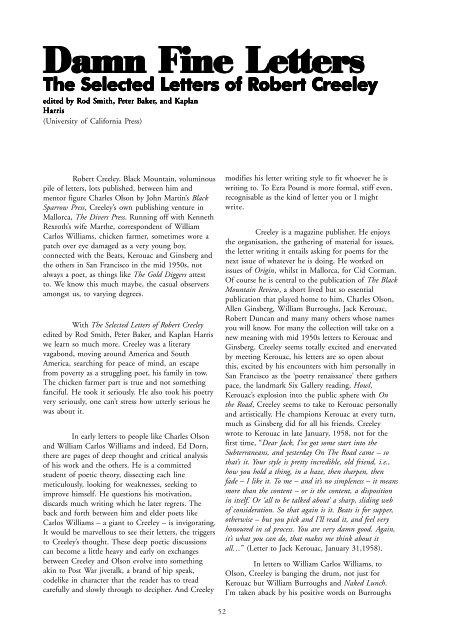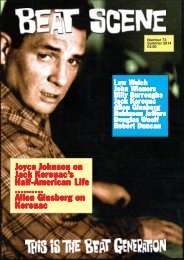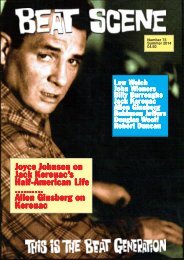You also want an ePaper? Increase the reach of your titles
YUMPU automatically turns print PDFs into web optimized ePapers that Google loves.
Damn Fine Letters<br />
The Selected Letters of Robert Creeley<br />
edited by Rod Smith, Peter Baker<br />
aker, , and Kaplan<br />
Harris<br />
(University of California Press)<br />
Robert Creeley. Black Mountain, voluminous<br />
pile of letters, lots published, between him and<br />
mentor figure Charles Olson by John Martin’s Black<br />
Sparrow Press, Creeley’s own publishing venture in<br />
Mallorca, The Divers Press. Running off with Kenneth<br />
Rexroth’s wife Marthe, correspondent of William<br />
Carlos Williams, chicken farmer, sometimes wore a<br />
patch over eye damaged as a very young boy,<br />
connected with the Beats, Kerouac and Ginsberg and<br />
the others in San Francisco in the mid 1950s, not<br />
always a poet, as things like The Gold Diggers attest<br />
to. We know this much maybe, the casual observers<br />
amongst us, to varying degrees.<br />
With The Selected Letters of Robert Creeley<br />
edited by Rod Smith, Peter Baker, and Kaplan Harris<br />
we learn so much more. Creeley was a literary<br />
vagabond, moving around America and South<br />
America, searching for peace of mind, an escape<br />
from poverty as a struggling poet, his family in tow.<br />
The chicken farmer part is true and not something<br />
fanciful. He took it seriously. He also took his poetry<br />
very seriously, one can’t stress how utterly serious he<br />
was about it.<br />
In early letters to people like Charles Olson<br />
and William Carlos Williams and indeed, Ed Dorn,<br />
there are pages of deep thought and critical analysis<br />
of his work and the others. He is a committed<br />
student of poetic theory, dissecting each line<br />
meticulously, looking for weaknesses, seeking to<br />
improve himself. He questions his motivation,<br />
discards much writing which he later regrets. The<br />
back and forth between him and elder poets like<br />
Carlos Williams – a giant to Creeley – is invigorating.<br />
It would be marvellous to see their letters, the triggers<br />
to Creeley’s thought. These deep poetic discussions<br />
can become a little heavy and early on exchanges<br />
between Creeley and Olson evolve into something<br />
akin to Post War jivetalk, a brand of hip speak,<br />
codelike in character that the reader has to tread<br />
carefully and slowly through to decipher. And Creeley<br />
modifies his letter writing style to fit whoever he is<br />
writing to. To Ezra Pound is more formal, stiff even,<br />
recognisable as the kind of letter you or I might<br />
write.<br />
Creeley is a magazine publisher. He enjoys<br />
the organisation, the gathering of material for issues,<br />
the letter writing it entails asking for poems for the<br />
next issue of whatever he is doing. He worked on<br />
issues of Origin, whilst in Mallorca, for Cid Corman.<br />
Of course he is central to the publication of The Black<br />
Mountain Review, a short lived but so essential<br />
publication that played home to him, Charles Olson,<br />
Allen Ginsberg, William Burroughs, Jack Kerouac,<br />
Robert Duncan and many many others whose names<br />
you will know. For many the collection will take on a<br />
new meaning with mid 1950s letters to Kerouac and<br />
Ginsberg. Creeley seems totally excited and enervated<br />
by meeting Kerouac, his letters are so open about<br />
this, excited by his encounters with him personally in<br />
San Francisco as the ‘poetry renaissance’ there gathers<br />
pace, the landmark Six Gallery reading, Howl,<br />
Kerouac’s explosion into the public sphere with On<br />
the Road, Creeley seems to take to Kerouac personally<br />
and artistically. He champions Kerouac at every turn,<br />
much as Ginsberg did for all his friends. Creeley<br />
wrote to Kerouac in late January, 1958, not for the<br />
first time, “Dear Jack, I’ve got some start into the<br />
Subterraneans, and yesterday On The Road came – so<br />
that’s it. Your style is pretty incredible, old friend, i.e.,<br />
how you hold a thing, in a haze, then sharpen, then<br />
fade – I like it. To me – and it’s no simpleness – it means<br />
more than the content – or is the content, a disposition<br />
in itself. Or ‘all to be talked about’ a sharp, sliding web<br />
of consideration. So that again is it. Beats is for supper,<br />
otherwise – but you pick and I’ll read it, and feel very<br />
honoured in sd process. You are very damn good. Again,<br />
it’s what you can do, that makes me think about it<br />
all…” (Letter to Jack Kerouac, January 31,1958).<br />
In letters to William Carlos Williams, to<br />
Olson, Creeley is banging the drum, not just for<br />
Kerouac but William Burroughs and Naked Lunch.<br />
I’m taken aback by his positive words on Burroughs<br />
52





